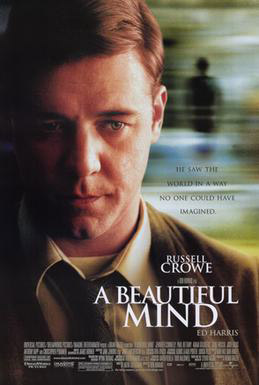films and plays involving mathematics

Mathematicians and mathematics rarely make an entrance on the silver screen or the stage, unless as parodies in the form of mad professors and meaningless scrawled equations. A notable recent exception is A Beautiful Mind (2001), directed by Ron Howard and starring Russell Crow as the brilliant but mentally troubled mathematician John Nash. Although a fine love story and a well-crafted film, which won four Oscars, A Beautiful Mind is weak on math and inaccurate in many of its details of Nash's life and battle with schizophrenia.
Rain Man (1988), also based on a true story, co-stars Dustin Hoffman as an autistic savant with a photographic memory and a genius for mental arithmetic. Good Will Hunting (1997), written by Matt Damon and Ben Affleck and starring Robin Williams, is about a young man who has led a troubled life but has an amazing talent for mathematics. His abilities are discovered when he is in trouble with the police, and he soon has to decide whether to pursue his mathematical future and leave his family and friends behind.
In Darren Aronofsky's disturbing independent film Pi (1998), the main character is a mathematician obsessed with his search for patterns within pi's infinite decimal places. He believes they can be used to predict chaotic behaviors, including that of the stock market. Throughout the film he is pursued by ruthless stock market players and by rabbis trying to find a mathematical way to communicate with God. In the science fiction film Cube (1997), where six people awake to find themselves trapped in a deadly maze, one of the characters uses mathematical skills to solve the puzzle and find a way to escape.
Lesser known films with a strong mathematical theme include Mario Martone's Death of a Neapolitan Mathematician; Peter Greenaway's Drowning by Numbers; George Csicsery's N Is a Number; and Moebius, made by students and faculty at the Universidad del Cine of Buenos Aires. Mathematics has also found its way onto the stage. The musical Fermat's Last Tango (2000), a fictionalized account of Andrew Wiles's struggle to prove Fermat's last theorem, was performed in New York by the York Theatre company. It followed the Pulitzer prize winning play "Proof" by David Aubern about the death of a brilliant mathematician and the repercussions for his daughters and his student.


